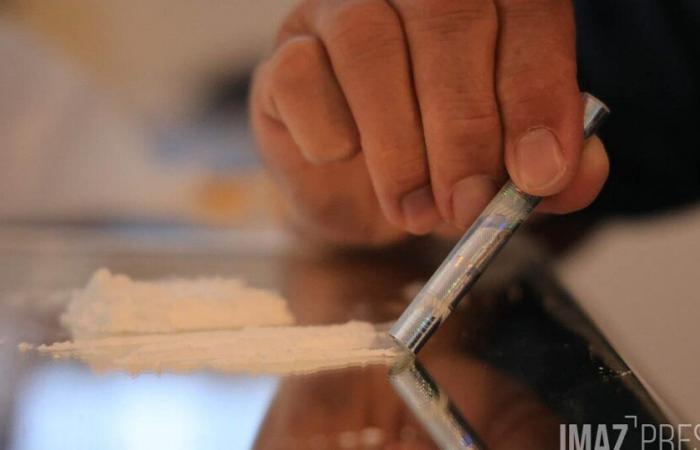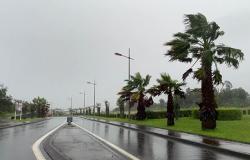While the fight against HIV has made remarkable progress in recent years, the situation is deteriorating in certain Indian Ocean countries. In Madagascar in particular, new infections have exploded. And the increase in the use of drugs like heroin only accentuates the crisis (Photo rb/www.imazpress.com)
It was also in Madagascar that a conference was held at the end of October, in Antananarivo, bringing together those involved in the fight against HIV, STIs, hepatitis and addictions from the Comoros, Madagascar, Reunion, Rodrigues and Seychelles. The objective was to take stock of the health situation, but also to find ways to collaborate between countries in the region to try to find solutions.
The findings were alarming: drug use and infections were increasing throughout the region. And the resources allocated to the fight against these scourges are absolutely not sufficient.
Between 2006 and 2022, HIV infections increased by 151% in Madagascar, for example, and deaths linked to the virus increased by 279%. These figures are probably underestimated, according to Doctor Catherine Gaud, co-founder and president of the Rive association, who attended the conference.
“The WHO estimates that only 22% of infected people have been diagnosed in Madagascar. A prevalence survey is underway, but we assume that 5% of the population is affected” explains Catherine Gaud. In a country of 30 million inhabitants, that represents 1.5 million people.
In the Diego Suarez region in the north of the country, a local survey determined that about 10% of the population was affected by HIV. Which would represent around 146,000 people.
If 99% of people diagnosed on the Big Island have access to treatment, only 57% of them have an undetectable viral load. Beyond screenings, the question of the quality of care arises widely.
Furthermore, only 31% of pregnant women are screened for HIV during their pregnancy, which does not allow them to have access to preventive treatment and therefore increases the risk of contamination of newborns.
“Every day, babies are born with HIV. This is not acceptable when this disease is detectable and treatable,” insists the president of the Rive association. “It shouldn’t be seen anymore.”
Added to the epidemic is an increase in heroin consumption, while Madagascar has become a drug hub in the region. Health services have noted “a clear increase in heroin consumption” in the territory, without being able to quantify it. A use which increases the risks of infection with HIV but also with hepatitis C, via the exchange of syringes.
– The entire region concerned –
Madagascar is not the only island in the region to be affected. In the Comoros, if the epidemic seems small with 117 people treated for HIV, stigma and discrimination “probably hide part of the epidemic”.
The groups most at risk include, among others, men who have sex with men, as well as sex workers. Repressed populations who cannot necessarily approach health services in complete safety.
The Rive association also notes that in Mayotte, “78.5% of patients in the active queue are migrants, coming from the Comoros, Madagascar and the Great Lakes region”. Suggesting that the epidemic is underestimated in the Comoros. In Mayotte, in 2023, 522 patients were being monitored for HIV, and “85.7% of patients diagnosed during the year also come from these countries.”
In Mauritius, although the law criminalizing drug users has changed, between 10 and 20,000 people still use heroin. Around 8,400 people are also on methadone, a treatment used in cases of opioid addiction.
HIV has also experienced a rebound in the last three years, and the number of deaths remains constant. UNAIDS estimates that 13,000 people are infected on the island, or 0.8% of the population. 21% of these patients are drug users, 14% are sex workers, and 28% of these people are transgender, the latter being at the intersection of vulnerable populations.
In Seychelles, where heroin consumption affects 10% of the population – or around 10,000 people – HIV infections but also hepatitis C are increasing. Around 80 new cases of HIV were detected in 2023, with effective treatment. The “growing number of people who are addicted to drugs and using multiple illicit drugs, who have difficulty accessing treatment” is of particular concern to health professionals. Especially since patients “present late”.
Reunion Island recorded 51 new HIV contaminations in 2023. The average age of patients has, however, increased significantly, reaching 54 years, therefore signifying an improvement in the care and quality of life of patients. 96% of these patients also have a zero viral load, meaning that they live a completely normal life outside of taking their treatment.
If these diseases are on the rise, it is, according to the World Health Organization report, due to a declining use of condoms among younger people.
In Reunion, three out of ten sexual relations are unprotected (29%). If we focus only on girls, the proportion of unprotected sex among schoolgirls would rise to 45%, according to the Health Observatory. Among high school girls, this proportion decreases to 30%.
Although the use of heroin is very marginal on the island, the diversion of drugs for non-medical use remains a real problem, and the consumption of drugs such as cocaine and ecstasy is exploding.
Read also: HIV, sexually transmitted infections: young people increasingly contaminated and less and less protected
– Regional cooperation –
Faced with this observation, sector experts are calling for a new regional control plan. Health professionals insist on essential collaboration between the countries in the area, and in particular on the solidarity of Reunion with its neighboring countries which do not benefit from the same training and infrastructure.
“HIV, like drug consumption, which are closely linked, mainly concerns marginalized populations: homosexuals, transgender people, sex workers…The problem is therefore that these people do not come for treatment” regrets Catherine Gaud. “I remind you that addiction is a chronic illness, so there is an urgent need to destigmatize discourse around the subject,” she insists.
“The main problem is screening. We miss a lot of opportunities to screen during medical examinations, the tests are not decentralized in the community, and people are not trained enough. We need to move “says the doctor. “Madagascar has been totally forgotten by world organizations, while they ardently take care of the countries of southern Africa. This is unacceptable, access to testing must be global.”
For Catherine Gaud, “we must put all patients on the same footing, and develop a new regional program to help our friends in the area. We must imagine how we can work together”
Another obstacle: laws that can hinder access to care, including the criminalization of drug use, but also laws that criminalize homosexuality or even sex work. “We must work to move towards ethics, the right to health, and human rights” believes the doctor.
Health professionals must also “have reliable data”. “You have to know where you are starting from, to know how to attack the problem” recalls Catherine Gaud.
Furthermore, she wants to “change the way we look at these people”. “Discrimination is the primary cause of lack of access to care. When we are discriminated against by caregivers, by our family and loved ones, when we cannot speak, we do not get treatment. Health systems must be protective. “
It was also agreed that those in the sector were “not trained enough”. “We could imagine a diploma, to develop prevention sessions, adapting them according to the target audience. We must also develop psycho-social skills, and train in the management of all pathologies linked to these problems” she lists.
Finally, she calls for promoting screening. “This is done well in Reunion, but it does not necessarily reach the right audiences. Syphilis is the most forgotten one, for example. And we need advocacy in the area to deploy a good policy.”
Indeed, HIV is not the only one to be on the rise. In Reunion, syphilis affects more and more pregnant women.
Catherine Gaud admits, “we have a lot of work”. “But the states are asking, and we must therefore try to build this aid.”
as/www.imazpress.com / [email protected]
News from Reunion, Indian Ocean, Health, HIV






